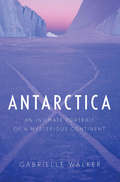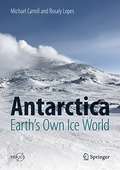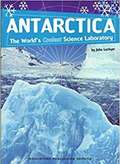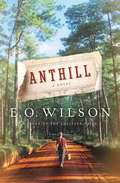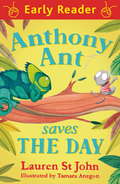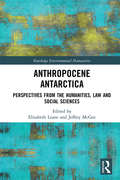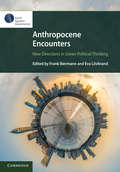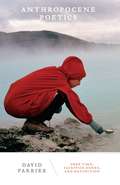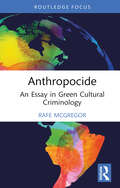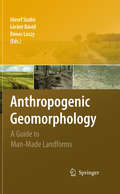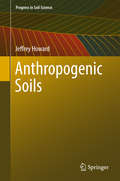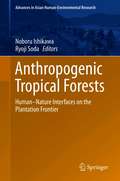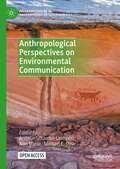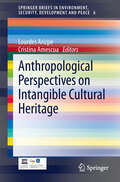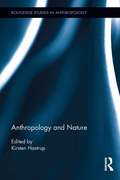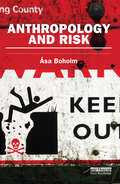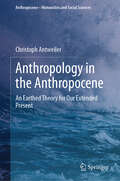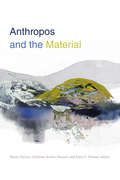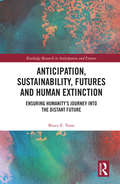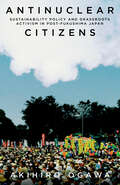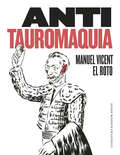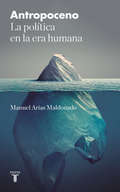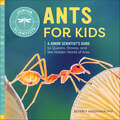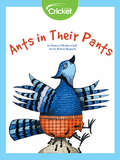- Table View
- List View
Antarctica: An Intimate Portrait of a Mysterious Continent
by Gabrielle WalkerThe acclaimed science writer presents a wide-ranging exploration of Antarctica&’s history, nature, and global significance in this &“rollicking good read&” (Kirkus). From the early expeditions of Ernest Shackleton to David Attenborough&’s documentary series Frozen Planet, the continent of Antarctica has captured the world&’s imagination. After the Antarctic Treaty of 1961, decades of scientific research revealed the true extent of its many mysteries. Now former Nature magazine staff writer Gabrielle Walker tells the full story of Antarctica—from its fascinating history to its uncertain future and the international teams of researchers who brave its forbidding climate. Drawing on her broad travels across the continent, Walker weaves all the significant threads of life on the vast ice sheet into a multifaceted narrative, illuminating what it really feels like to be there and why it draws so many different kinds of people. She chronicles cutting-edge science experiments, visits to the South Pole, and unsettling portents about our future in an age of global warming. &“We are all anxious Antarctic watchers now, and Walker's book is the essential primer.&”—The Guardian, UK
Antarctica: Earth's Own Ice World (Springer Praxis Books)
by Michael Carroll Rosaly LopesIn 2016, scientist Rosaly Lopes and artist Michael Carroll teamed up as fellows of the National Science Foundation to travel to Mount Erebus, the world’s southernmost active volcano in Antarctica. The logistics of getting there and complex operations of Antarctica's McMurdo Station echo the kinds of strategies that future explorers will undertake as they set up settlements on Mars and beyond. This exciting popular-level book explores the arduous environment of Antarctica and how it is similar to other icy worlds in the Solar System.The bulk of this story delves into Antarctica’s infrastructure, exploration, and remote camps, culminating on the summit of Erebus. There, the authors explored the caves and ice towers on the volcano’s flanks, taking photographs and generating original art depicting scenes in Antarctica and terrestrial analogs on other planets and moons. Readers will see an intimate side of Mount Erebus and Antarctica while surveying the region’s history, exploration, geology, and volcanology, which includes research funded by the National Science Foundation’s United States Antarctic Programs. Richly illustrated with photographs and stunning paintings showcasing the beauty of the harsh continent, the book captures the spirit and splendor of the authors’ journey to Erebus.
Antarctica: The World's Coolest Science Laboratory
by John LockyerAntarctica: The World's Coolest Science Laboratory by John Lockyer.
Anthill
by Edward O. Wilson"What the hell do you want?" snarled Frogman at Raff Cody, as the boy stepped innocently onto the reputed murderer's property. Fifteen years old, Raff, along with his older cousin, Junior, had only wanted to catch a glimpse of Frogman's 1000-pound alligator. Thus, begins the saga of Anthill, which follows the thrilling adventures of a modern-day Huck Finn, whose improbable love of the "strange, beautiful, and elegant" world of ants ends up transforming his own life and the citizens of Nokobee County. Battling both snakes bites and cynical relatives who just don't understand his consuming fascination with the outdoors, Raff explores the pristine beauty of the Nokobee wildland. And in doing so, he witnesses the remarkable creation and destruction of four separate ant colonies, whose histories are epics that unfold on picnic grounds, becoming a young naturalist in the process. An extraordinary undergraduate at Florida State University, Raff, despite his scientific promise, opts for Harvard Law School, believing that the environmental fight must be waged in the courtroom as well as the lab. Returning home a legal gladiator, Raff grows increasingly alarmed by rapacious condo developers who are eager to pave and subdivide the wildlands surrounding the Chicobee River. But one last battle awaits him in his epic struggle. In a shattering ending that no reader will forget, Raff suddenly encounters the angry and corrupt ghosts of an old South he thought had all but disappeared, and learns that war is a genetic imperative, not only for ants but for men as well. Part thriller, part parable, Anthill will not only transfix readers with its stunning twists and startling revelations, but will provide readers with new insights into the meaning of survival in our rapidly changing world.
Anthony Ant Saves the Day (Early Reader)
by Lauren St JohnEarly Readers are stepping stones from picture books to reading books. A blue Early Reader is perfect for sharing and reading together. A red Early Reader is the next step on your reading journey.Antony the ant is tired of being small and wishes he was big enough to be a hero. Then, one day, he climbs to the top of the tallest tree in the jungle and makes an enormous discovery!
Anthropocene Antarctica: Perspectives from the Humanities, Law and Social Sciences (Routledge Environmental Humanities)
by Elizabeth Leane Jeffrey McGeeAnthropocene Antarctica offers new ways of thinking about the ‘Continent for Science and Peace’ in a time of planetary environmental change. In the Anthropocene, Antarctica has become central to the Earth’s future. Ice cores taken from its interior reveal the deep environmental history of the planet and warming ocean currents are ominously destabilising the glaciers around its edges, presaging sea-level rise in decades and centuries to come. At the same time, proliferating research stations and tourist numbers challenge stereotypes of the continent as the ‘last wilderness.’ The Anthropocene brings Antarctica nearer in thought, entangled with our everyday actions. If the Anthropocene signals the end of the idea of Nature as separate from humans, then the Antarctic, long considered the material embodiment of this idea, faces a radical reframing. Understanding the southern polar region in the twenty-first century requires contributions across the disciplinary spectrum. This collection paves the way for researchers in the Environmental Humanities, Law and Social Sciences to engage critically with the Antarctic, fostering a community of scholars who can act with natural scientists to address the globally significant environmental issues that face this vitally important part of the planet.
Anthropocene Encounters: New Directions in Green Political Thinking
by Frank Biermann Eva LövbrandCoined barely two decades ago, the Anthropocene has become one of the most influential and controversial terms in environmental policy. Yet it remains an ambivalent and contested formulation, giving rise to a multitude of unexpected, and often uncomfortable, conversations. This book traces in detail a broad variety of such 'Anthropocene encounters': in science, philosophy and literary fiction. It asks what it means to 'think green' in a time when nature no longer offers a stable backdrop to political analysis. Do familiar political categories and concepts, such as democracy, justice, power and time, hold when confronted with a world radically transformed by humans? The book responds by inviting more radical political thought, plural forms of engagement, and extended ethical commitments, making it a fascinating and timely volume for graduate students and researchers working in earth system governance, environmental politics and studies of the Anthropocene.
Anthropocene Poetics: Deep Time, Sacrifice Zones, and Extinction (Posthumanities #50)
by David FarrierHow poetry can help us think about and live in the Anthropocene by reframing our intimate relationship with geological time The Anthropocene describes how humanity has radically intruded into deep time, the vast timescales that shape the Earth system and all life-forms that it supports. The challenge it poses—how to live in our present moment alongside deep pasts and futures—brings into sharp focus the importance of grasping the nature of our intimate relationship with geological time. In Anthropocene Poetics, David Farrier shows how contemporary poetry by Elizabeth Bishop, Seamus Heaney, Evelyn Reilly, and Christian Bök, among others, provides us with frameworks for thinking about this uncanny sense of time.Looking at a diverse array of lyric and avant-garde poetry from three interrelated perspectives—the Anthropocene and the &“material turn&” in environmental philosophy; the Plantationocene and the role of global capitalism in environmental crisis; and the emergence of multispecies ethics and extinction studies—Farrier rethinks the environmental humanities from a literary critical perspective. Anthropocene Poetics puts a concern with deep time at the center, defining a new poetics for thinking through humanity&’s role as geological agents, the devastation caused by resource extraction, and the looming extinction crisis.
Anthropocide: An Essay in Green Cultural Criminology (Routledge Studies in Crime, Culture and Media)
by Rafe McGregorThrough an examination of Alfonso Cuarón’s Children of Men, this book demonstrates the ability of cinematic fictions, and other complex narrative fictions, to contribute to meeting the climate challenge by shaping the desires of audiences. What if there was a single feature film that showed us everything we need to know about climate catastrophe culture? What if that same film also made the philosophies of Slavoj Žižek, Mark Fisher, Francis Fukuyama, and Fredric Jameson accessible? Identifying the climate challenge as a cultural challenge, this book provides an unprecedented criminological analysis of both Children of Men and Fisher’s oeuvre from 1998 to 2022 and demonstrates the capacity of cinematic narratives to shape climate catastrophe culture. Seeking to be part of the solution to the climate challenge, it is the first criminological study to link the capacity of cinematic fictions to shape desire to solutions to the climate crisis. It is also one of the most detailed and most rigorous criminological case studies of a cinematic work to date.Anthropocide: An Essay in Green Cultural Criminology will be of great interest to students and scholars of green criminology, cultural criminology, narrative criminology, film theory, philosophy of film, and ecocriticism.
Anthropogenic Geomorphology: A Guide to Man-Made Landforms
by Denes Loczy József Szabó Lóránt DávidAnthropogenic geomorphology studies society's impact on the geographical environment, and especially on the Earth's surface. This volume provides guidance to students discussing the basic topics of anthropogenic geomorphology. The chapters cover both its system, and its connections with other sciences, as well as the way the subject can contribute to tackling today's practical problems. The book represents all fields of geomorphology, giving an introduction to the diversity of the discipline through examples taken from a range of contexts and periods, and focusing on examples from Europe. It is no accident that anthropogenic geomorphology has been gaining ground within geomorphology itself. Its results advance not only the theoretical development of the science but can be applied directly to social and economic issues. Worldwide, anthropogenic geomorphology is an integral and expanding part of earth sciences curricula in higher education, making this a timely and relevant text.
Anthropogenic Soils (Progress in Soil Science)
by Jeffrey HowardThis book is a state-of-the-art review of the physical, chemical and mineralogical properties of anthropogenic soils, their genesis morphology and classification, geocultural setting, and strategies for reclamation, revitalization, use and management.
Anthropogenic Tropical Forests: Human–Nature Interfaces on the Plantation Frontier (Advances in Asian Human-Environmental Research)
by Noboru Ishikawa Ryoji SodaThe studies in this volume provide an ethnography of a plantation frontier in central Sarawak, Malaysian Borneo. Drawing on the expertise of both natural scientists and social scientists, the key focus is the process of commodification of nature that has turned the local landscape into anthropogenic tropical forests. Analysing the transformation of the space of mixed landscapes and multiethnic communities—driven by trade in forest products, logging and the cultivation of oil palm—the contributors explore the changing nature of the environment, multispecies interactions, and the metabolism between capitalism and nature. The project involved the collaboration of researchers specialising in anthropology, geography, Southeast Asian history, global history, area studies, political ecology, environmental economics, plant ecology, animal ecology, forest ecology, hydrology, ichthyology, geomorphology and life-cycle assessment.Collectively, the transdisciplinary research addresses a number of vital questions. How are material cycles and food webs altered as a result of large-scale land-use change? How have new commodity chains emerged while older ones have disappeared? What changes are associated with such shifts? What are the relationships among these three elements—commodity chains, material cycles and food webs? Attempts to answer these questions led the team to go beyond the dichotomy of society and nature as well as human and non-human. Rather, the research highlights complex relational entanglements of the two worlds, abruptly and forcibly connected by human-induced changes in an emergent and compelling resource frontier in maritime Southeast Asia.
Anthropological Perspectives on Environmental Communication (Palgrave Studies in Anthropology of Sustainability)
by Annelie Sjölander-Lindqvist Ivan Murin Michael E. DoveIn the continuous search for sustainability, the exchange of diverse perspectives, assumptions, and values is indispensable to environmental protection. Through anthropological and ethnographic analyses, this collection addresses how interests, values, and ideologies affect dialogue and sustainability work. Drawing on studies from three continents – Europe, North America, and South America – the paradoxes and the plurality of meanings associated with the creation of sustainable futures are explored. The book focuses on how communication practices collide with organizational frameworks, customary practices, livelihoods, and landscape. In so doing, the authors explore the meanings of environmental communication, pushing beyond environmental advocacy rhetoric to emphasize stronger anthropological engagement within communities to achieve more impactful environmental communication practice. Empirically the book’s chapters explore a diverse set of issues, ranging from coastal management in the European north to Native American place naming in Alaska. They further share findings from studies of contaminated land remediation in Sweden, conflicts over water resources in Chile, management of heritage and national parks in Northern Arizona, and cultural transmission in Slovakia.This is an open access book.
Anthropological Perspectives on Intangible Cultural Heritage (SpringerBriefs in Environment, Security, Development and Peace #6)
by Cristina Amescua Lourdes ArizpeA decade after the approval of the UNESCO 2003 Convention for the Safeguarding of Intangible Cultural Heritage (ICH), the concept has gained wide acceptance at the local, national and international levels. Communities are recognizing and celebrating their Intangible Heritage; governments are devoting important efforts to the construction of national inventories; and anthropologists and professionals from different disciplines are forming a new field of study. The ten chapters of this book include the peer-reviewed papers of the First Planning Meeting of the International Social Science Council's Commission on Research on ICH, which was held at the Centro Regional de Investigaciones Multidisciplinarias (UNAM) in Cuernavaca, Mexico in 2012. The papers are based on fieldwork and direct involvement in assessing and reconceptualizing the outcomes of the UNESCO Convention. The report in Appendix 1 highlights the main points raised during the sessions.
Anthropologist: Scientist of the People
by Mary BattenProvides an in-depth look at the life of an anthropologist as one explains her field and data gathering processes in relation to her fifteen-year study of the Ache, a tribe of hunter-gatherers living in Paraguay.
Anthropology and Nature (Routledge Studies in Anthropology #14)
by Kirsten HastrupOn the basis of empirical studies, this book explores nature as an integral part of the social worlds conventionally studied by anthropologists. The book may be read as a form of scholarly "edgework," resisting institutional divisions and conceptual routines in the interest of exploring new modalities of anthropological knowledge making. The present interest in the natural world is partly a response to large-scale natural disasters and global climate change, and to a keen sense that nature matters matters to society at many levels, ranging from the microbiological and genetic framing of reproduction, over co-species development, to macro-ecological changes of weather and climate. Given that the human footprint is now conspicuous across the entire globe, in the oceans as well as in the atmosphere, it is difficult to claim that nature is what is given and permanent, while people and societies are ephemeral and simply derivative features. This implies that society matters to nature, and some natural scientists look towards the social sciences for an understanding of how people think and how societies work. The book thus opens up a space for new forms of reflection on how natures and societies are generated.
Anthropology and Risk (Earthscan Risk in Society)
by Asa BoholmDrawing on theory from anthropology, sociology, organisation studies and philosophy, this book addresses how the perception, communication and management of risk is shaped by culturally informed and socially embedded knowledge and experience. It provides an account of how interpretations of risk in society are conditioned by knowledge claims and cultural assumptions and by the orientationof actors based on roles, norms, expectations, identities, trust and practical rationality within a lived social world. By focusing on agency, social complexity and the production and interpretation of meaning, the book offers a comprehensive and holistic theoretical perspective on risk, based on empirical case studies and ethnographic enquiry. As a selection of Åsa Boholm’s publications throughout her career, along with a newly written introduction overviewing the field, this book provides a unified perspective on risk as a construct shaped by social and cultural contexts.This collection should be of interest to students and scholars of risk communication, risk management, environmental planning, environmental management and environmental and applied anthropology.
Anthropology in the Anthropocene: An Earthed Theory for Our Extended Present (Anthropocene – Humanities and Social Sciences)
by Christoph AntweilerIn this book, anthropologist and geologist Christoph Antweiler shows that geology is a special, namely historical, natural science and is therefore relevant for a historically informed anthropology. He argues that we do not only need a geologically informed cultural anthropology, but conversely also an anthropologically oriented geology. A comprehensive geology must include material human culture as a fundamental geological phenomenon. In relation to cultural anthropology, the author discusses the challenge the Anthropocene poses for cultural anthropology as a traditionally micro-oriented social science. The book discusses where the blind spots lie in the highly interdisciplinary discussion. Common narratives are critically scrutinized. The author argues for the need for a new discipline: geoanthropology.
Anthropos and the Material
by Christian Krohn-Hansen Penny Harvey Knut G. NustadThe destructive effects of modern industrial societies have shaped the planet in such profound ways that many argue for the existence of a new geological epoch called the Anthropocene. This claim brings into relief a set of challenges that have deep implications for how relations between the human, the material, and the political affect contemporary social worlds. The contributors to Anthropos and the Material examine these challenges by questioning and complicating long-held understandings of the divide between humans and things. They present ethnographic case studies from across the globe, addressing myriad topics that range from labor, economics, and colonialism to technology, culture, the environment, agency, and diversity. In foregrounding the importance of connecting natural and social histories, the instability and intangibility of the material, and the ways in which the lively encounters between the human and the nonhuman challenge conceptions of liberal humanism, the contributors point to new understandings of the capacities of people and things to act, transform, and adapt to a changing world.
Anticipation, Sustainability, Futures and Human Extinction: Ensuring Humanity’s Journey into The Distant Future (Routledge Research in Anticipation and Futures)
by Bruce E. TonnThis book considers the philosophical underpinnings, policy foundations, institutional innovations, and deep cultural changes needed to ensure that humanity has the best chance of surviving and flourishing into the very distant future. Anticipation of threats to the sustainability of human civilization needs to encompass time periods that span not just decades but millennia. All existential risks need to be jointly assessed, as opposed to addressing risks such as climate change and pandemics separately. Exploring the potential events that are likely to cause the biggest risks as well as asking why we should even desire to thrive into the distant future, this work looks at the ‘biggest picture possible’ in order to argue that futures-oriented decision-making ought to be a permanent aspect of human society and futures-oriented policy making must take precedent over the day-to-day policy making of current generations in times of great peril. The book concludes with a discourse on the truly fundamental bottom-up changes needed in our personal psychologies and culture to support these top-down recommendations. This book is of great interest to philosophers, policy analysts, political scientists, economists, psychologists, planners, and theologians.
Antinuclear Citizens: Sustainability Policy and Grassroots Activism in Post-Fukushima Japan (Anthropology of Policy)
by Akihiro OgawaFollowing the Great East Japan Earthquake on March 11, 2011, tsunamis engulfed the Fukushima Daiichi nuclear power plant located on Japan's Pacific Coast, leading to the worst nuclear disaster the world has seen since the Chernobyl crisis of 1986. Prior to this disaster, Japan had the third largest commercial nuclear program in the world, surpassed only by those in the United States and France—nuclear power significantly contributed to Japan's economic prosperity, and nearly 30% of Japan's electricity was generated by reactors dotted across the archipelago, from northern Hokkaido to southern Kyushu. This long period of institutional stasis was, however, punctuated by the crisis of March 11, which became a critical juncture for Japanese nuclear policymaking. As Akihiro Ogawa argues, the primary agent for this change is what he calls "antinuclear citizens"— a conscientious Japanese public who envision a sustainable life in a nuclear-free society. Drawing on over a decade of ethnographic research conducted across Japan—including antinuclear rallies, meetings with bureaucrats, and at renewable energy production sites—Ogawa presents an historical record of ordinary people's actions as they sought to survive and navigate a new reality post-Fukushima. Ultimately, Ogawa argues that effective sustainability efforts require collaborations that are grounded in civil society and challenge hegemonic ideology, efforts that reimagine societies and landscapes—especially those dominated by industrial capitalism—to help build a productive symbiosis between industry and sustainability.
Antitauromaquia
by Manuel Vicent El RotoEl escritor Manuel Vicent y el ilustrador El Roto embisten contra una costumbre que despierta pasión y odio por igual en este alegato antitaurino. Esta Antitauromaquia es algo más que una diatriba contra la fiesta nacional. La costumbre primitiva de sacrificar toros en público y convertir esa muerte en una ceremonia moral ha perdido ya toda su estética. La corrida ha quedado solo en un residuo de aquella España negra, zaragatera y triste en la que la crueldad con los animales no se distinguía de la violencia social y política. El espectáculo de la muerte festiva de un toro supone una agresión a la sensibilidad humana. Este es un alegato contra todos los tipos de violencia que se expresan en la fiesta taurina, una liturgia de la tortura que algunos pretenden elevar todavía al rango de cultura porque creen que en España o eres toro o eres matador. Esta Antitauromaquiaes un aviso para que no te toreen. Reseñas:«Su gusto por el detalle no disminuye la contundencia gráfica. Cuando Vicent habla de algo lo ofrece abierto en la mesa de quirófano.»David Trueba, Babelia «El Roto tiene una eterna capacidad de señalar el punto más vulnerable de nuestra sociedad, de acertar siempre con sus demoledoras críticas.»Papel en Blanco
Antropoceno: La política en la era humana
by Manuel Arias MaldonadoEl Antropoceno es una nueva época geológica cuyo rasgo central es el protagonismo de la humanidad, convertida en agente de cambio medioambiental a escala planetaria. Desde una postura original, elegante y sensata, Arias Maldonado aprovecha todas las oportunidades que ofrece el concepto, un excelente marco teórico para el debate sobre la sostenibilidad global, la conservación de las formas y espacios naturales, así como para la moralización de las relaciones entre el ser humano y la naturaleza. La colonización humana del planeta ha terminado por conducirnos a una nueva época geológica: el Antropoceno. Al menos, así lo indica una sólida hipótesis científica según la cual el progresivo acoplamiento de los sistemas sociales y naturales ha hecho de la humanidad el principal agente de cambio medioambiental global. De manera que el Holoceno, bajo cuyas benévolas condiciones climáticas ha prosperado la humanidad, está dejando paso a un nuevo régimen planetario lleno de peligros y oportunidades. Del cambio climático a la extinción de especies, de la urbanización a la reforestación, el Antropoceno es un fenómeno ambiguo: un efecto colateral del progreso humano que despierta a las fuerzas telúricas que operan en el tiempo profundo y nos recuerda que somos criaturas terrenales. En este libro de vocación interdisciplinar, Manuel Arias Maldonado somete a riguroso análisis este novísimo concepto y se pregunta por sus consecuencias políticas. O sea: por los efectos que para la sociedad liberal y la democracia tiene una mutación planetaria que obliga a reorganizar las relaciones socionaturales.
Ants for Kids: A Junior Scientist's Guide to Queens, Drones, and the Hidden World of Ants (Junior Scientists)
by Beverly GerdemanCrawl inside the curious world of ants with the Junior Scientists series for kids ages 6-9! Ants are scurrying, social creatures with unique abilities to carry huge loads, work as a team, and fiercely protect their colony. This book gives you a microscopic look into the hidden world of ants, answering all your big questions about our small, hardworking neighbors. Learn fun facts about flat headed Turtle Ants, wide-eyed Gigantiops, and many more. Explore colorful photos and cool profiles on how big each ant is, what they eat, where they're found, and more!Get up close and underground with:A look inside the anthill—Discover which jobs each ant has in its colony, how they communicate, how they build their homes, and how they fight.Vibrant photographs—Get up close and personal with bright, colorful photos of dozens of different types of ants.Off-the-page projects—Become an ant ambassador with instructions for making your very own ant farm and tips on ant watching in the wild.Discover all the secrets about the ant queen, her drones, and loyal colony in Ants for Kids.
Ants in Their Pants
by Patricia Nikolina ClarkIf you accidentally sat on an anthill, and little black ants started to crawl all over you, would you stay there? Of course not!
